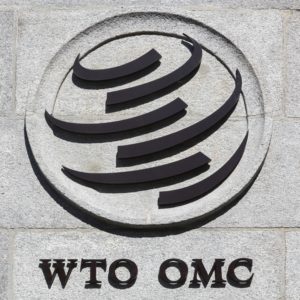A panel at the World Trade Organization (WTO) recently decided a dispute between the United States and India over the competitiveness related to renewable energy in both countries in favor of New Delhi.
The ruling is a blow to eight U.S. states that have doled out a plethora of financial incentives to local producers of renewable energy systems and product inputs: California, Connecticut, Delaware, Massachusetts, Michigan, Minnesota, Montana, and Washington. The WTO panel ruled they have violated international trade law by improperly creating uncompetitive environments among renewable energy producers.
These states have been offering incentives such as tax credits, renewable energy credits through direct and indirect rebates, refunds for the purchase of renewable energy systems bought from American companies and other incentives.
The panel found that “all the U.S. state measures at issue are inconsistent with GATT 1994 because they provide an advantage for the use of domestic products, which amounts to less favorable treatment for like imported products.” GATT 1994, or the General Agreement on Tariffs and Trade 1994, is an international trade agreement that governs the flow of trade goods across the globe.
The U.S. and Indian governments have 60 days to appeal the ruling. It is unclear whether American trade officials will do so. A federal official told the Associated Press that the verdict is “effectively moot.”
While this hands the U.S. government a loss in the global trade war, the impact of the ruling could be viewed in a different light. Since the federal Green New Deal remains mired in Congress, several states mentioned in the complaint filed by India are considering their own versions of the hotly-debated environmental overhaul proposed by progressive Democrats in Washington D.C.
“The WTO decision collides with a groundswell of progressive interest in a Green New Deal — a plan that looks a lot like the state policies that the commercial body just ruled against,” notes Todd Tucker of the Roosevelt Institute in an analysis for the Washington Post.
The Green New Deal prescribes various proposed projects and requirements intended to put the United States down the path to zero-emissions. The proposal and many of the state versions incentivize domestic producers to develop clean energy programs and other local approaches for transforming the economy. Tucker notes, however, that the WTO decision ultimately presents “Buy Local” and “Hire Local” incentive programs as protectionist trade policies.
“These are the sorts of provisions that India and other countries can be expected to challenge if and when a Green New Deal ever gets through Congress,” he wrote.
“As a general matter, international trade agreement rules can provide mild constraints on domestic regulatory policies, so they could, in theory, have an impact on regulations designed to promote environmental objectives,” notes Simon Lester of the Cato Institute.
Lester wrote a response arguing that the WTO ruling is too narrow to have a significant impact on any overhauls promised by Green New Deal-style policies.
“What I recommend, then, is that anyone interested in a Green New Deal should avoid protectionist regulatory measures and tariffs, as they will create conflict with the trade regime while undermining the environmental goals,” he added. “And with subsidies, give them to consumers rather than to producers. In my view, there is not much inherent conflict between trade and the environment. Rather, the problems arise when environmental policies get hijacked by special interests who want to use them for their own financial gain.”

